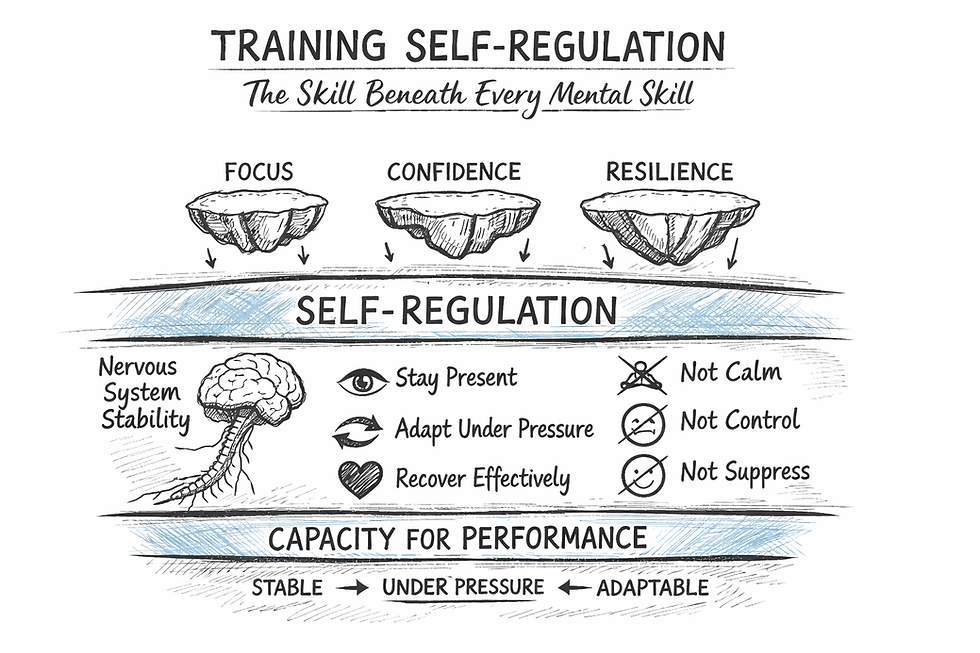Calm Amidst Chaos: Harnessing Attention for Peak Performance
- Kate Allgood
- Oct 8, 2024
- 3 min read
As an athlete, you can often find yourself in the thick of mental storms—those overwhelming moments of doubt, fear, or self-criticism that can derail your performance. Whether you're facing a crucial match, a big competition, or simply the pressure of training, it’s essential to recognize how powerful your attention is and how you can use it to your advantage.
The Nature of the Mind Storm
When a "mind storm" strikes, your thoughts can spiral out of control. You might replay past mistakes, worry about future outcomes, or engage in negative self-talk. In these moments, it’s crucial to avoid getting swept up in the chaos. Engaging with these stories can lead to increased performance anxiety and decreased performance.
Instead, you can adopt a practice of "impersonal witnessing." This means observing your thoughts and emotions without judgment or attachment. When you find yourself caught in a mental storm, take a moment to step back. Cut off the juice of attention from the negative narrative. Rather than diving deeper into the analysis, focus on maintaining a state of neutrality.
The Power of Neutrality
By simply observing without engaging, you allow your mind to return to its natural state—what can be described as "pure awareness." This is the clarity and focus that can enhance performance. In sports, this translates to being fully present in the moment, free from distractions.

Here are a few practical strategies to help you unplug during those critical moments:
Deep Breathing: Take a few deep breaths to center yourself. This simple act can ground your thoughts and reduce anxiety, creating space for clarity.
Mindfulness Practices: Engage in mindfulness exercises, such as meditation, to strengthen your ability to observe thoughts without judgment.
Focus on the Process: Shift your attention to the immediate actions you need to take, such as your breathing, body positioning, or the rhythm of your movements. This brings you back to the present moment.
Create a Mantra: Develop a personal mantra that you can repeat during stressful moments. This can help anchor your focus and redirect your attention away from negative spirals.
Harnessing Attention for Success
Remember, your attention is a powerful tool. By consciously directing it away from stormy thoughts and towards neutral awareness, you empower yourself to perform at your best. This doesn’t mean ignoring your emotions or thoughts; rather, it’s about creating space to experience them without being attached to them.
In the end, the ability to unplug from mental chaos is what distinguishes great athletes from the rest. By practicing impersonal witnessing, you can cultivate a mindset that embraces focus, clarity, and resilience, ultimately enhancing your performance and enjoyment of the sport.
Embrace the magnificence of this practice. When you cut the noise and connect with your true self, you’ll find that you can ride the waves of competition with greater ease and confidence. Keep your attention where it counts—on the game, the moment, and the joy of being an athlete.
Own your focus. Own your game.
Kate
About: Kate Allgood is educated in the field of applied sport psychology. She holds two Masters degrees in psychology where she graduated with distinction. After a very successful hockey career, she has spent the past 14 years working one on one with high school, college, Olympic, and professional athletes to help them with their mindset, mental performance and mental skills training. Kate has also been a consultant for professional teams, including the Anaheim Ducks primary minor league affiliate the San Diego Gulls, to help the team and players develop their mental game. It is important to note that while Kate has graduate school training in applied sport psychology and general psychology, she does not diagnose or treat clinical disorders, and is not a licensed psychologist.
**The information provided is not to dispense medical advice or prescribe the use of any technique, either directly or indirectly, as a form of treatment for physical, emotional, or medical problems, without the advice of a physician. The information provided is only to offer information of a general nature to help you in your quest for high performance. If you know or suspect you have a health problem, it is recommended you seek your physician's advice.



Comments